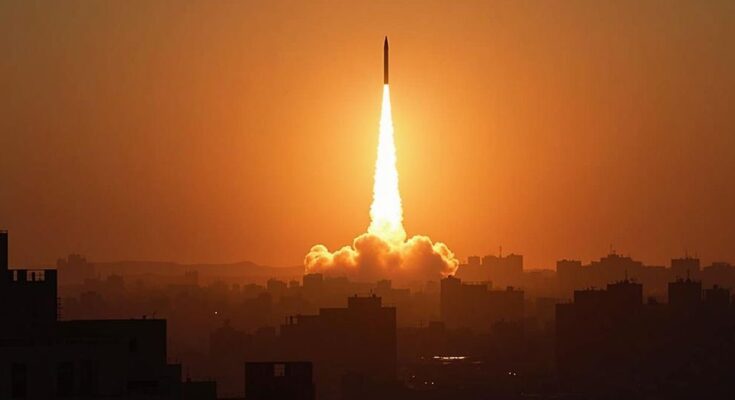The conflict between Israel and Hezbollah intensified as Hezbollah launched a missile targeting central Israel, which the IDF intercepted. Approximately 40 rockets were fired from Lebanon, with one hitting an assisted living facility in Safed without casualties. The Kremlin has urged Russian nationals in Lebanon to leave swiftly, citing growing dangers. Iranian officials stated that killing key Hezbollah figures will not incapacitate the group, while regional countries expressed fears of escalating tensions into widespread war.
In the escalating tensions between Israel and Hezbollah, a recent missile launch from Hezbollah struck central Israel for the first time, targeting an area believed to contain the Mossad headquarters. The missile, identified as the ‘Qader’ ballistic type, was intercepted by the Israeli Defense Forces (IDF) using its David’s Sling defense system, marking a significant instance in the ongoing conflict. This incident followed the launch of approximately 40 rockets from Lebanon into northern Israel, with one specifically hitting an assisted living facility in Safed. Fortunately, there were no reported casualties in this attack, although it caused significant damage to the building. The situation has prompted heightened international concern, with the Kremlin advising Russian nationals to vacate Lebanon swiftly due to deteriorating safety conditions in the region. Kremlin spokesman Dmitry Peskov emphasized that Israeli military actions against Hezbollah could destabilize the Middle East further. In Lebanon, reports indicate that at least five individuals were killed during Israeli strikes in southern Lebanon, exacerbating fears of an all-out war. Egypt, Iraq, and Jordan expressed alarm at Israel’s aggressive actions, condemning them as provocations that could escalate tensions in the region. Amidst these developments, Iranian leadership has warned that the targeted assassinations of key Hezbollah figures will not incapacitate the group. Supreme Leader Ayatollah Ali Khamenei asserted that such tactics would be ineffective in subduing Hezbollah, who continue to respond with force.
The ongoing conflict between Israel and Hezbollah has seen increasing violence and military responses from both sides. Hezbollah’s recent missile attacks mark a significant shift in the conflict, demonstrating their capability and willingness to escalate. The geopolitical ramifications of these exchanges raise concerns about regional stability and a potential wider war in the Middle East. International actors, including Russia and Iran, are keenly observing and responding to the dynamics of this conflict, which continues to evolve amid complex historical grievances as well as contemporary issues surrounding governance, security, and regional power struggles.
The recent escalation of hostilities between Israel and Hezbollah signifies a critical juncture in the Middle Eastern conflict landscape. The exchange of missiles, the targeting of civilian infrastructure, and the international community’s responses underline the precarious balance of power and the potential for widespread conflict. As the situation develops, it remains imperative for global actors to engage diplomatically to reduce tensions and prevent further loss of life.
Original Source: www.haaretz.com




